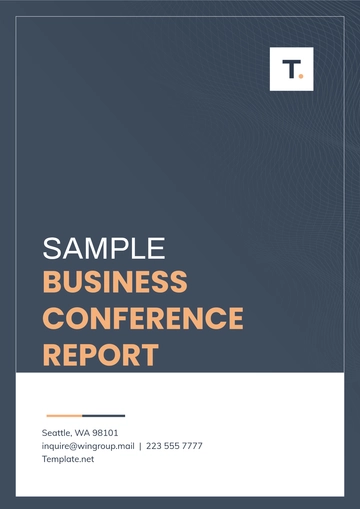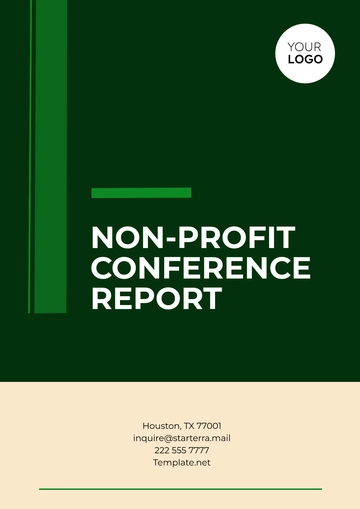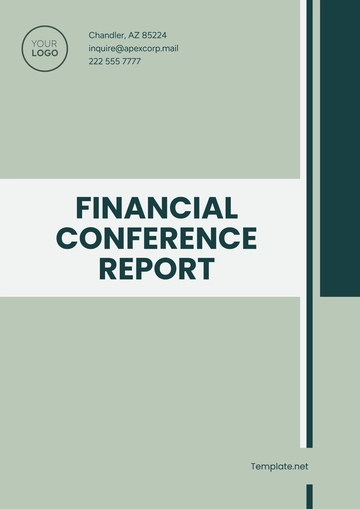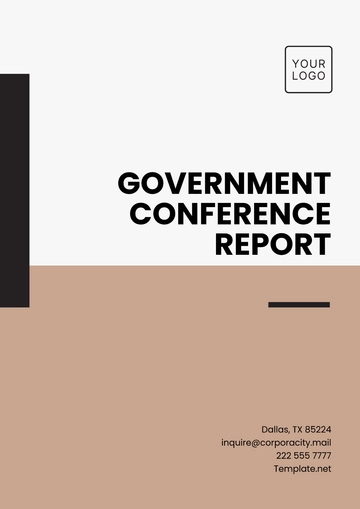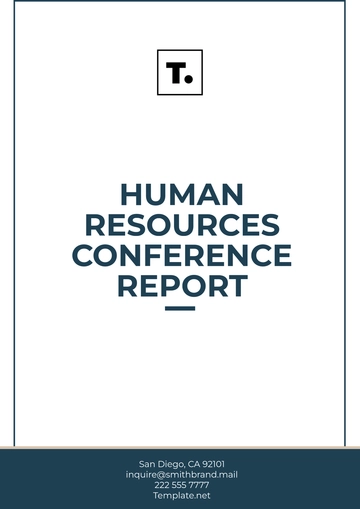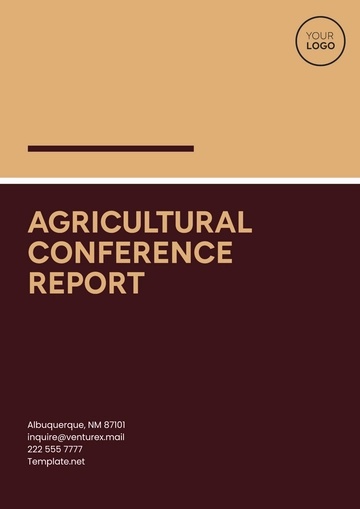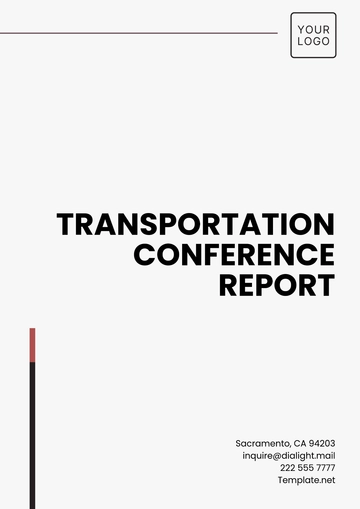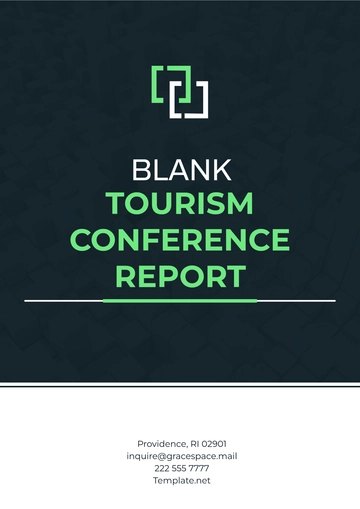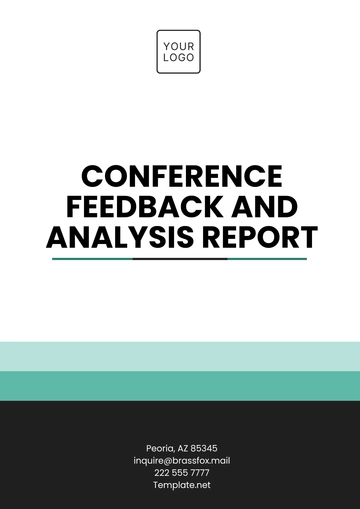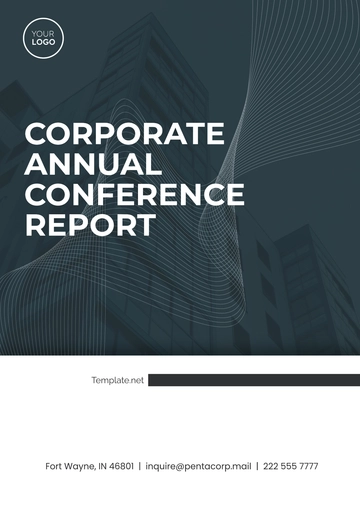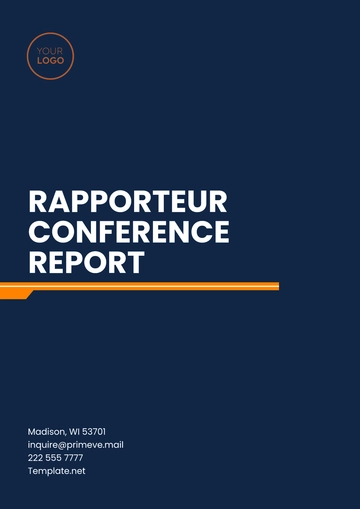Free Financial Conference Report
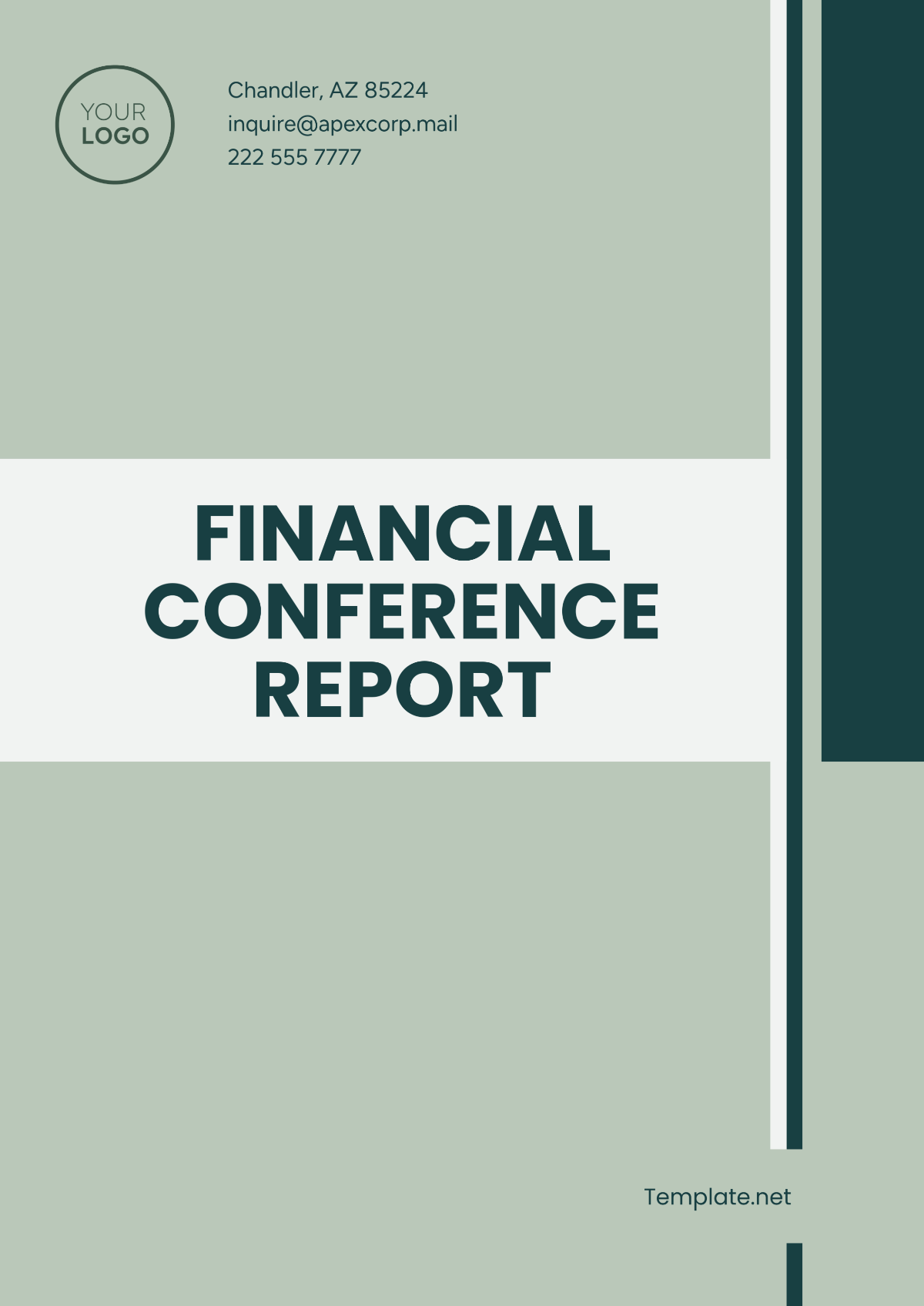
Prepared by: [YOUR NAME]
Company: [YOUR COMPANY NAME]
Date: November 28, 2054
Introduction
This report provides a comprehensive overview of the recent financial conference held on November 25-27, 2054. The event, which attracted industry leaders, investors, and financial professionals, aimed to discuss the latest trends, challenges, and opportunities within the financial sector. The conference featured a series of keynote speeches, panel discussions, and networking opportunities, offering valuable insights into the future direction of the industry.
Key Takeaways
The following sections highlight the most notable discussions and insights shared during the conference.
1. Economic Outlook and Global Market Trends
A major topic throughout the conference was the global economic outlook, with a focus on the potential impact of geopolitical events, inflationary pressures, and regulatory changes. Experts from international financial institutions discussed the following:
Global Growth Projections: Economic growth is expected to slow down slightly in the coming years due to ongoing uncertainties in key markets. However, regions such as Asia and emerging markets are anticipated to continue growing at a stronger pace than developed economies.
Inflation and Interest Rates: The impact of inflation remains a concern globally. Central banks in developed markets have indicated the possibility of maintaining high interest rates for an extended period to control inflation, which could lead to tighter liquidity.
Investment Strategies: Attendees discussed adjusting investment strategies in response to these macroeconomic challenges, emphasizing diversification, sustainable investments, and hedging strategies to mitigate risk.
2. Technological Innovation in Finance
Another key focus was the role of technological innovation in reshaping the financial sector. Several speakers explored the following themes:
Fintech Growth: The rise of fintech companies continues to disrupt traditional banking models. Experts highlighted the shift towards digital banking, blockchain technologies, and the increasing adoption of artificial intelligence (AI) for risk management, trading algorithms, and customer service.
Cybersecurity and Data Privacy: With the increasing digitization of financial services, the importance of cybersecurity was underscored. Companies are investing heavily in advanced cybersecurity solutions to protect sensitive financial data from cyberattacks and ensure regulatory compliance.
RegTech: Regulatory technology (RegTech) solutions are gaining traction, providing firms with tools to streamline compliance processes, reduce costs, and better manage regulatory risks.
3. Sustainable Finance and ESG (Environmental, Social, and Governance) Trends
Sustainable finance and ESG investing were prominent topics throughout the event. Several sessions discussed the growing importance of integrating sustainability into investment decisions and the financial ecosystem:
ESG Reporting and Disclosure: There is increasing pressure on companies to disclose their ESG performance transparently. Participants shared strategies for improving ESG reporting to align with investor expectations and regulatory requirements.
Green Bonds and Sustainable Investment Vehicles: The market for green bonds and other sustainable financial instruments is expanding. Panelists discussed the evolving standards and frameworks for these products, and how they are reshaping investment portfolios.
Socially Responsible Investing: Investors are becoming more conscious of social and environmental issues, leading to a shift toward impact investing, where the focus is on generating both financial returns and positive social outcomes.
4. Regulatory Landscape and Compliance Challenges
The regulatory environment remains complex, and several sessions addressed the evolving challenges facing financial institutions in this area:
Global Regulatory Trends: Regulations around the world are becoming increasingly stringent. Experts discussed the importance of staying ahead of regulatory changes to ensure compliance and mitigate potential legal risks.
Financial Crimes and Anti-Money Laundering (AML): A key discussion centered on the increasing threat of financial crimes, such as money laundering and fraud. Speakers emphasized the importance of robust AML frameworks and the role of technology in identifying and preventing illicit financial activities.
5. The Future of Banking and Financial Institutions
Panelists also explored the future of traditional financial institutions in the face of growing competition from fintech startups and global economic challenges. Some of the key points included:
Digital Transformation of Banks: Traditional banks are under pressure to digitally transform their operations to stay competitive. This includes investing in AI-driven customer service, enhancing digital payment systems, and adopting blockchain technology for efficiency and security.
Partnerships Between Fintechs and Banks: Many traditional banks are forming partnerships with fintech firms to innovate faster and stay relevant. Collaborative approaches are being seen as a way to bridge the gap between traditional financial systems and emerging digital solutions.
Future-Proofing Financial Institutions: Speakers advised financial institutions to embrace agility, innovate continuously, and focus on customer experience to remain viable in an increasingly competitive environment.
Conclusion
The financial conference provided valuable insights into the current state and future trends of the financial sector. While the global economy faces numerous challenges, including inflation, geopolitical instability, and evolving regulations, there are significant opportunities for innovation, particularly in the areas of fintech, sustainable finance, and regulatory technology. Financial professionals must stay informed about these trends and adapt their strategies to thrive in an ever-changing landscape.
The discussions on ESG, digital transformation, and the role of technology in financial services highlight the growing importance of sustainability, innovation, and compliance in shaping the future of finance.
- 100% Customizable, free editor
- Access 1 Million+ Templates, photo’s & graphics
- Download or share as a template
- Click and replace photos, graphics, text, backgrounds
- Resize, crop, AI write & more
- Access advanced editor
The Financial Conference Report Template from Template.net is fully editable and customizable to fit your specific needs. With our AI Editor Tool, you can easily modify the content, format, and layout for a professional and polished report. Ideal for documenting financial events, this template ensures accuracy and clarity in your presentation.
You may also like
- Sales Report
- Daily Report
- Project Report
- Business Report
- Weekly Report
- Incident Report
- Annual Report
- Report Layout
- Report Design
- Progress Report
- Marketing Report
- Company Report
- Monthly Report
- Audit Report
- Status Report
- School Report
- Reports Hr
- Management Report
- Project Status Report
- Handover Report
- Health And Safety Report
- Restaurant Report
- Construction Report
- Research Report
- Evaluation Report
- Investigation Report
- Employee Report
- Advertising Report
- Weekly Status Report
- Project Management Report
- Finance Report
- Service Report
- Technical Report
- Meeting Report
- Quarterly Report
- Inspection Report
- Medical Report
- Test Report
- Summary Report
- Inventory Report
- Valuation Report
- Operations Report
- Payroll Report
- Training Report
- Job Report
- Case Report
- Performance Report
- Board Report
- Internal Audit Report
- Student Report
- Monthly Management Report
- Small Business Report
- Accident Report
- Call Center Report
- Activity Report
- IT and Software Report
- Internship Report
- Visit Report
- Product Report
- Book Report
- Property Report
- Recruitment Report
- University Report
- Event Report
- SEO Report
- Conference Report
- Narrative Report
- Nursing Home Report
- Preschool Report
- Call Report
- Customer Report
- Employee Incident Report
- Accomplishment Report
- Social Media Report
- Work From Home Report
- Security Report
- Damage Report
- Quality Report
- Internal Report
- Nurse Report
- Real Estate Report
- Hotel Report
- Equipment Report
- Credit Report
- Field Report
- Non Profit Report
- Maintenance Report
- News Report
- Survey Report
- Executive Report
- Law Firm Report
- Advertising Agency Report
- Interior Design Report
- Travel Agency Report
- Stock Report
- Salon Report
- Bug Report
- Workplace Report
- Action Report
- Investor Report
- Cleaning Services Report
- Consulting Report
- Freelancer Report
- Site Visit Report
- Trip Report
- Classroom Observation Report
- Vehicle Report
- Final Report
- Software Report

